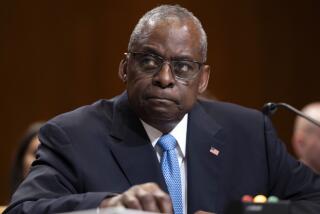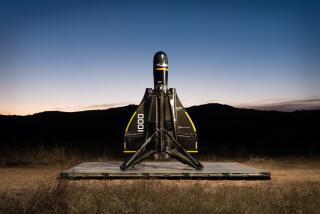U.S. May Advise Republics on Junking A-Arms
- Share via
WASHINGTON — U.S. nuclear weapons specialists plan to travel to the new Commonwealth of Independent States in early January for technical talks on ways the United States can assist in the destruction of nuclear warheads there, Defense Secretary Dick Cheney said Friday.
But Bush Administration officials cautioned that the team’s work could be hampered by the Russian military’s wariness of U.S. advisers and by congressional strictures on the use of $400 million in U.S. aid designated for nuclear weapons destruction.
“We are prepared to move just as soon as it’s clear that there’s something useful we can do with that money,” Cheney said in a Cable News Network interview. But he added: “The Russians . . . up to now have given every indication that they believe they can handle the matter themselves.”
In meetings last month with U.S. government experts, representatives of the Soviet Defense Ministry and the Ministry of Atomic Power and Industry conceded reluctantly that they may need U.S. help to develop vehicles that can safely transport nuclear weapons.
But U.S. officials fear that an already humiliated commonwealth military will balk at the stiff conditions Congress has placed on the use of such aid. Before any of the $400 million can be spent, President Bush must certify that the recipients will adhere to six conditions, including a promise to forgo any military modernization beyond “reasonable levels.”
The conditions, said one U.S. official, “present major verification hurdles in their own right,” and may rankle the recipients the aid is designed to help.
Cheney said Friday that the former Soviet military traditionally has been plagued by its “limited capability” to dismantle nuclear weapons. That inexperience led officials of the Defense and Atomic Energy ministries last month to admit that they do not have containers to transport and store the nuclear weapons that have been dispersed throughout four republics.
When Soviet military experts revealed the shortcoming to U.S. advisers at a November meeting in Moscow, the ensuing dialogue offered a clear illustration of the challenges that Washington faces in extending aid to those it once considered its adversaries.
According to one U.S. official who attended the meetings, the American representatives--mindful of congressional conditions on the aid--asked their Soviet counterparts to detail how U.S. funds would be used to build such containers and what impact that assistance would have on the schedule of weapons destruction.
The officials became guarded, asking the Americans to put their questions in writing and offering vague promises to respond in December.
The U.S. official said that, while he hopes the commonwealth military will provide the answers in early January, the American team has not received any word from those with whom they met in November.
“The Soviet military believes they have done a very good job with the safety and security of their nuclear weapons,” said a knowledgeable Administration official. “Many of them don’t feel they need our help.”
The strings attached to U.S. assistance may further stir the commonwealth military’s reluctance to accept such aid. Congress said Bush must certify that aid recipients are committed to using their own resources to make a substantial investment in dismantling weapons, that they will not use nuclear material culled from the dismantled weapons to build new nuclear weapons and that they will allow U.S. inspectors to verify the destruction of weapons.
More to Read
Sign up for Essential California
The most important California stories and recommendations in your inbox every morning.
You may occasionally receive promotional content from the Los Angeles Times.











